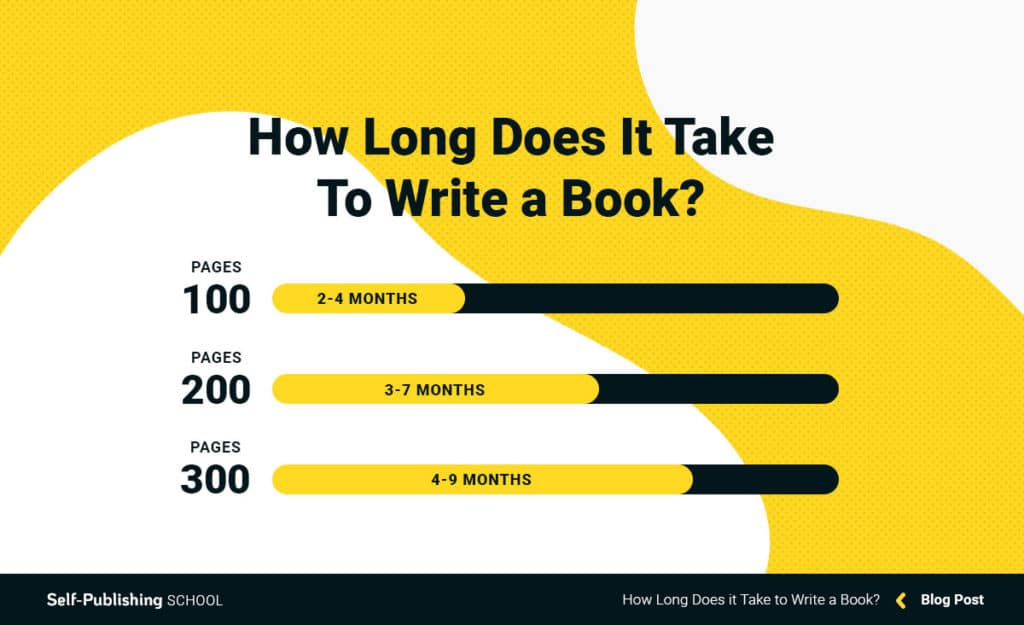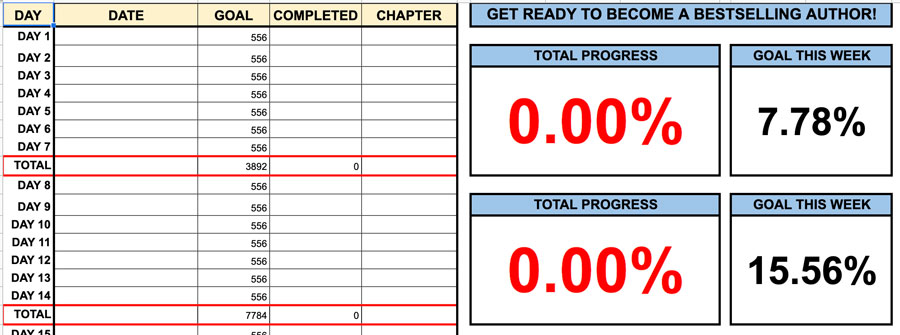One valuable thing a writer can learn is how long does it take to write a book.
And while most sources say it depends, we break it down for you.
Many authors, when asked how long it took to produce their debut novels, gave answers ranging from four years to a decade.
In other words, a very long time, BUT…
Here at Self-Publishing School, we’ve focused the process of writing and publishing a book, and our students are able to complete their drafts in as little as 60 days, publishing in 90 days…and we’ll teach you how.
But there is amazing news:
Writing your book can take far less time than you think. You just need to have the right mindset, a reliable system, and to stay motivated to write.
Here’s what you’ll learn about how long it takes to write a book:
- How to create a deadline
- The average time it takes to write a book
- How long it takes to write a 100 page book
- How long it takes to write a 200 page book
- How long it takes to write a 300 page book
- How to write a book faster
- Prioritizing to take less time to write a book
- Create word count goals
- Find accountability to write a book faster
- Set challenges to finish writing your book
Here at Self-Publishing School, our goal is to improve this arduous writing process. Right now, we coach our students to routinely complete a new book in just 90 days, finishing their first draft in as little as 30 days!
They are able to accomplish this by following a simple step-by-step guide that we’re going to share with you today.
How long does it take to write a book?
On average, a first-time writer can take up to 6-12 months to write a book, unless you use our 90-day book writing system. The typical timeline to write a book is between 4 to 8 months otherwise.
How long it takes to write a book largely depends on how much time the writer puts into actually writing it, though. If you’re dedicated, driven, and have a book that’s only 30,000-40,000 words, you can finish writing a book in a weekend.
The truth about how long it takes to write a book depends on how many words are in it.
Here’s a guideline for how long it takes to write a book based on wordcount:
- 30,000 – 50,000 words: 500 words/day = 60 – 100 days
- 50,000 – 80,000 words: 500 words/day = 100 – 160 days
- 80,000 – 100,000 words: 500 words/day = 160 – 200 days
Essentially, the length of time it takes can be anywhere from two months to 7 months (or even longer!) depending on how often you write and how many words you write per session.
If you want a quick way to find out, fill out this word and page count calculator below and it will tell you the average time it takes to write that book:
FREE TOOL
Word and Page Count Calculator
Choose your book type, genre, and audience for a word count and page number total.
Enter your details below to get your personalized word and page counts for your book!
Your Book Will Have
words
pages
*These results are based on industry standards. The total word and page count will vary from book to book and is dependent on your writing and overall book formatting*
Average Time to Write This Book: 60 days
Following the guidelines below, you can learn to supercharge your own book writing process, and you’ll become a published author much faster.
What is the average time it takes to write a book?
The average person writing a book for the first time can expect to spend anywhere from 4 months to over a year writing a book. While this might seem like it takes a long time to write a book, there are always methods to shorten this.
Taking everything above into account, the truth is that most people don’t write every day, especially if you have a family and a full-time job.
So let’s break this down a bit further for the average person living an average life that doesn’t allot daily writing time (& they don’t have our system for getting more done with less time):
- 30,000 – 50,000 words: 500 words 3 days per week = 4 months – 7 months
- 50,000 – 80,000 words: 500 words 3 days per week = 7 months – 11 months
- 80,000 – 100,000 words: 500 words 3 days per week = 11 months – 1 year +
As you can see, if you maintain an average of 1500 words written per week, writing your book can span from 4 months to over a year without the right system to get it finished quickly.

How long does it take to write a 100 page book?
A 100 page book is about 30,000 words. If you write more than 1500 words per week, you can expect for it to take 2 – 4 months to write a 100 page book.
How long does it take to write a 200 page book?
The average person can expect to spend 3 -7 months writing a 200 page book if they focus on writing more than 1500 words per week.
Now, this would equate to roughly 50,000 words. Many of our students can actually finish their draft of this length in only 30 days with our process.
How long does it take to write a 300 page book?
A 300 page book can take 4 – 9 months to write at an average of about 80,000 words, writing 1500 or more per week.
The average fiction book that’s at a higher level than middle grade will run about this length. In fact, the large majority of young adult books are 70,000 – 90,000 words and can take a bit longer for the full writing, revising, and self-editing process.
How to Write a Book Faster so it Doesn’t Take as Long
If you want to know how to write a book faster so it doesn’t take as long, here are our best tips.
#1 – Establish a Strategic Deadline
Deadlines are designed to help you inch closer to completing your book by giving yourself a writing habit. It also encourages you to work every day hitting both short-term and long-term goals.
However, you won’t find success by setting arbitrary due dates. They must be set up for your book’s success.
Here are 3 ways to establish strategic deadlines:
- Define realistic deadlines. Set short term and long term deadlines for each portion of your draft that breaks down your entire book.
- Set honest expectations. If you’re only able to write 500 words a day, so be it. Don’t push yourself into thinking that you can complete an unrealistic task. Be honest with your abilities and align it with your deadline.
- Implement rewards. Don’t make writing a book feel like a tedious job. Reward yourself for achieving your goals! Attaching rewards to each accomplishment will make finishing your book much more aspiring to complete.
#2 – Prioritize Your Writing Into Tasks
What separates those who can write multiple books to those who can barely write a page is the ability to prioritize. Because there are so many competing factors that pull away our time and energy, prioritizing is actually a very hard concept to implement.
But in order to write your book, you need to establish clear priorities to get anything done.
Here are some ways to prioritize your work:
- List out every detail of your book and turn them into tasks
- Assess each task to identify what carries the biggest value to completing your book
- Order tasks by its immediate priority and length of time to complete
- Anticipate unexpected changes to your schedule, and plan an alternative schedule to stay on track
ACTION STEP: Make the effort and spend a few hours prioritizing your writing process. You will be surprised with how much writing you can accomplish with a well thought out task plan.
#3 – Creating Word Count Goals
One of the best ways to accelerate the writing process is to set word count goals. Like training intervals, setting up word count goals will pace how many words to write a day.
First you have to understand how many words in a novel for your genre. Once you know this, you can work backward to figure out how much you have to write each day in order to reach your deadline.
By establishing these parameters for your own success, not only will you be more likely to accomplish these goals, but you will also notice improvements to your writing.
Here’s an example of a tracking sheet you can set up in order to accomplish your word count goals:

We recommend writing down your daily, weekly, and monthly word count goals to not only show your current progress, but to keep you motivated until you reach the end.
It also helps to include rewards for every new milestone!
ACTION STEP: Start your daily word count goal to 500-1,000 words per day. By completing 1,000 words per day, you’ll be looking at your completed 30,000 word first draft in one month!
#4 – Find Your Accountability Partner
A supportive partner can be a great soundboard, a first pair of eyes, and a protector of your sanity. They can also be the extrinsic motivation you need to meet your own deadlines and word counts.
When you have an accountability partner backing you up, it makes it harder to procrastinate because they expect great results from you!
At Self-Publishing School, we believe in the accountability system and encourage our students to pair up with other like-minded students to encourage one another and hold each other accountable for reaching goals and deadlines.
This is done through our Mastermind Community, so everyone has the same goal in mind: start writing a book and finish by self-publishing a book.
It’s a great motivating tactic and helps our students complete their books on time.
ACTION STEP: Find an accountability partner who is willing to encourage and hold you accountable to meet your deadlines!
#5 – Set Challenges for Yourself
Following the same routine can get old quickly especially for something lengthy like writing the first draft of your book.
To combat the fear of boredom and add more spark to your writing project, we encourage you to set challenges for yourself!
Here are some simple challenges to set to write your book faster:
- Double the word count you’ve originally set daily, monthly, yearly
- Purposely tighten deadlines to increase pressure
- Ban the use of your phone or all forms of distractions to make time for writing
- Read your unfinished draft out loud to someone new for feedback
ACTION STEP: Include a few of these challenges every so often to increase the intensity of your writing. You may tack on even better rewards for each successful challenge you’ve completed.
If you ever dream of becoming a self-published author, now is the time to finally make it a reality.
By following these guidelines on how to develop a robust writing process, you will have your first book ready to self-publish in no time.

